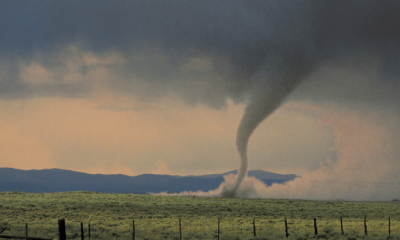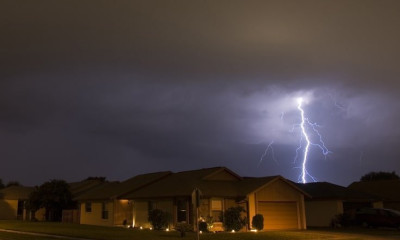Your Questions: Will Filing a Property Claim Affect My Rates?
No one wants to file a homeowner or business property insurance claim. If you’re filing a property claim, it means you’ve experienced some kind of damage or loss, a situation that is undoubtedly already causing you worry and stress. On top of that, there’s the entire process of filing a claim – the phone calls, the paperwork, proving your loss to the insurer and everything else. But at the back of your mind is likely another concern – what happens after this?
One of the top concerns most people have about filing a claim is whether it will impact their premium rates, or whether they may even lose their coverage. Many believe in some cases, it may even be better not to file a claim at all.
Let’s take a closer look at how making a claim may impact your coverage — and when involving your insurer may not be the best option.
Should I File an Insurance Claim?
One of the first things to determine when you have property damage at your home or business is whether the claim is worth filing. The gut reaction after suffering a fire or storm damage is to call the insurance company. After all, you pay your premiums to protect you in these situations; shouldn’t you use the insurance to help make any needed repairs? Depending on your insurance—and your deductible— it may not be worth the call.
If the damage is minor, such as cracks to siding, food spoilage from a power outage or other small issues that you can repair or replace on your own, it may be best to handle the loss on your own. The reasons are two-fold. First, in many cases, minor damages or issues may not even meet the cost of your deductible. This means you would be filing a claim in which you would not recoup much, if anywhere near, the dollar value of lost or damaged property. Second, there is the potential that filing the claim may make you appear to be more of an insurance risk, a situation that may impact your insurance rates and your insurability for the future.
It's also important to remember that your homeowner’s insurance is a protective coverage and not a maintenance policy. That means that if you suffer roof problems or structural collapse as a result of negligence on maintenance and home upkeep, that’s a situation that won’t be covered by your insurance. Putting a new roof on your home or replacing rotting floor joists isn’t a matter for your insurance; it’s a maintenance issue for you to handle on your own.
On the other hand, if you’ve experienced a more substantial claim, such as devastating fire damages or structural collapse, you’ll definitely want to involve your insurance company.
Significant property loss is what your insurance is designed to cover. While you never want to make a claim, these and other types of catastrophic damages and losses are just the situations when you should call your insurance company. Once you get the process started, Adjusters International/Basloe, Levin and Cuccaro can provide additional help and a second opinion to assist with your property claim.
How do Insurance Companies Determine Rates?
Whenever you file a claim on your homeowners policy or commercial insurance, it gets logged into a database system known as CLUE – the Comprehensive Loss and Underwriting Exchange. Each time you make a claim, whether major or minor, that information gets added to this system. It’s one that insurance companies refer to when determining your overall insurance rates. If you’ve had zero claims or no claims in several years, you’ll be viewed as a lower insurance risk than those who have made more claims.
But this system alone is not the only factor in determining your rates or renewal. Insurers also consider your overall payment history. If you have a steady and consistent track record of paying your premiums on time, you’re seen as a more reliable insurance customer and less of a financial risk to the policy provider.
“Insurance companies want to know that when you are a client, you’ll be paying into the system and aren’t expected to be a frequent claimant – under normal circumstances,” said Steven Vanuga, principal of Adjusters International/Basloe, Levin & Cuccaro. “If you’ve always paid your bills on time and never made a claim, you’ll find better rates and options versus someone who has a track record of late payments and numerous claims.”
Factors that Increase the Cost of Insurance
While claim and payment history are among the largest factors that drive the cost of your insurance premiums, many other factors play a role. These include features of your property, such as the presence of a pool, a trampoline or other potential hazards and the home’s overall condition. You may also receive discounts based on your proximity to emergency services, the response time rating for the local fire department or the presence of a fire hydrant near the property. Local crime and burglary rates also play a role, meaning that even if you don’t make a claim in a given year, you may still see an increase due to other local mitigating factors.
 Can an Insurance Company Drop You After a Claim?
Can an Insurance Company Drop You After a Claim?
While rates can fluctuate with a history of claims and myriad other external factors, one big question is whether your insurance company can — or will — drop you after making a claim.
“Insurance companies exist to provide coverage from the unexpected, but when the unexpected happens and they need to pay out on policy claims, it’s cause for them to review their business,” said Vanuga. “This can result in some people finding policies not being renewed or that their insurer stops even offering coverage for homeowners in the region or state.”
Reasons Insurance May Drop You
First, your overall claim history will be considered by your provider. Typically, if you haven’t made claims in the past — or no more than one claim in the past decade —it’s likely that you won’t be dropped after making a claim. A history of claims, however, can start to make you look like more of a risk and therefore less appealing as a policyholder for the insurance company.
The company may also raise rates in your area, particularly following a large claim event like a tornado or severe winter storm. It’s not uncommon for these unexpected events to cause an insurer to reconsider their policy coverages for a region, particularly if a large number of claims were made as a result. In this case, it may not just be your coverage that ends; instead, you may be just one of many customers suddenly seeking a new provider.
Finally, state laws in many areas allow insurance companies to drop some of their policies annually without needing a specific event or reason. In New York, for example, insurers can drop a certain percentage of the company’s book of business each year. While this is often driven by cost factors such as claims paid, increasing risk in an area or other reasons, insurers don’t always need to cite a definitive cause for cancellation.
Discounted but Disconnected
It’s also worth noting that you shouldn’t worry about your homeowner or commercial insurance policy going up due to any claims made on your auto coverage. Today many people opt to bundle their insurance coverages, using the same company for home, business, auto, specialty (RV, motorcycle, etc.) and any other insurance policies they need to protect their property. This often provides a great benefit in terms of your policy costs, but makes people worry about how using one policy might impact their other coverages.
Auto insurance and other types of insurance are not connected to your home or business coverage, so there’s no need to worry about a fender bender making your costs increase, at least for your property. Car insurance policies operate on an entirely different scale and count other factors in determining your risk and rate. That means claims made on auto policies will only impact your auto rates, while claims on homeowner or commercial property insurance may impact those rates and coverage options.
Make Sure You Get the Most from Your Claim
At the end of the day, if you’ve suffered a catastrophic loss, the right call is to file a claim with your insurance company. You pay your premiums and maintain your coverage to help assist you when you experience a major loss. If you have a serious property damage claim, you should turn to your insurance company to help you get back to normal. You also should contact a certified public adjuster like the team at Adjusters International/Basloe, Levin & Cuccaro to help you navigate the process.
Our team of licensed public adjusters are here to help make sure you get the full value for your claim. We understand that making a claim is inherently stressful. You’re navigating unfamiliar documents and processes, bureaucracy and the hectic time of whatever has occurred at your property in the first place. It’s also why public adjusters exist. We can help work with your insurance company to resolve your claim, assist with making sure your damages are properly appraised and assessed, and aid in the paperwork and procedures that need to be followed to expedite your claim. Contact us today and learn how we can help with your claim.













